 |
 |
 |
Part 2 (back to Part 1) NOVA: Do sharks make sounds? Gruber: They make hydrodynamic sounds when swerving and accelerating, and they make crunching sounds with their teeth and jaws. But they don't have special organs for sound production and apparently don't communicate with sound. NOVA: Sharks have an endless supply of teeth? Gruber: Yes, and they are unique in this way, too. They produce teeth continuously. Their teeth are not set in sockets like those of other vertebrates but rather loosely and flexibly attached by tendons to their jaws. If they didn't replace teeth continuously—up to 50,000 in a lifetime—their teeth would fall out. That is why shark teeth are the most abundant vertebrate fossil material on the Earth and in the sea.
Gruber: Several species do, including hammerheads and mackerel sharks. Typically, pelagic sharks that never encounter the bottom are adapted to swim all their lives. But the vast majority of sharks have a buccal (mouth) pump and are not so-called "obligate ram ventilators." (Ram ventilators like hammerheads and great whites must swim to pass water over their gills.) So the answer is no, emphatically. There are even some sharks with spiracles, holes on the top of their head that allow water to enter their gill chambers when the mouth is on the bottom.
Gruber: No way, Jose! Sharks have a unique, loose jaw suspension that allows them to raise their snout and loosen their jaw from the braincase, thrusting it forward so that, in effect, the shark has a terminal mouth right out there at the end. But in reality, sharks rarely bite pieces out of a prey. Usually, they engulf them with their amazing buccal or mouth pump, which acts like a slurp gun.
Gruber: Mackerel sharks, including great whites, makos, threshers, and porbeagles, have a heat-conserving mechanism known as the rete mirabile ("wonderful net"), a structure for warming blood passing over the gills. Whites can keep their core temperature up to 15°F above ambient seawater.
Gruber: Hard to say, because we don't know what pain means to an animal and can hardly describe it ourselves. Some people are almost insensitive to pain, others are highly sensitive. I have done minor surgery on sharks, and they seem not to feel it. On the other hand, using what is clearly aversive conditioning I was able to train sharks, showing that they do respond to pain, which can be used as a conditioned stimulus—and a powerful one. So yes, sharks feel something we would call pain. Continue: Can sharks survive finning? Cocos Island | Sharkmasters | World of Sharks | Dispatches E-mail | Resources | Site Map | Sharks Home Editor's Picks | Previous Sites | Join Us/E-mail | TV/Web Schedule | About NOVA Watch NOVAs online | Teachers | Site Map | Shop | Search | To Print PBS Online | NOVA Online | WGBH © | Updated June 2002 |
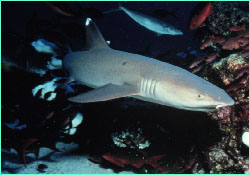 A whitetip cruises the reef edge.
A whitetip cruises the reef edge.
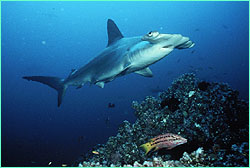 Scalloped hammerhead on the reef.
Scalloped hammerhead on the reef.
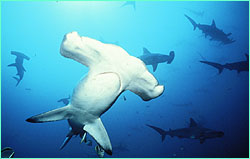 Mouth of a hammer.
Mouth of a hammer.
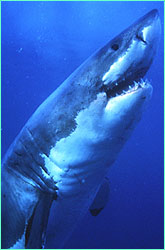 Great white shark
Great white shark
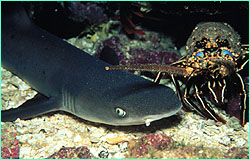 Cocos whitetip and lobster.
Cocos whitetip and lobster.